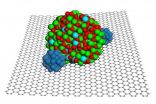(Press-News.org) Scratching deep beneath the surface, a team of researchers from the University of California, San Diego School of Medicine and three South Korean institutions have identified two distinct neuronal signaling pathways activated by a topical cream used to treat a variety of skin diseases. One pathway produces the therapeutic benefit; the other induces severe itching as a side effect.
The findings, published in this week's early online edition of the Proceedings of the National Academy of Sciences, point to the possibility of designing future drugs that effectively treat targeted conditions while blocking the cellular signals that can lead to problematic itching and scratching.
"This new pathway provides another avenue to block the scratching response that appears as a chronic side effect during treatments of cancer, renal failure or the use of some antibiotics," said Melvin I. Simon, PhD, an adjunct professor in the UCSD Department of Pharmacology and a corresponding co-author of the study, headed by Sang-Kyou Han, an adjunct assistant professor at UC San Diego.
Itching – and the scratching response – are part of a complex and imperfectly understood somatosensory process that includes complex, confounding psychological factors. The mechanisms involved are so sophisticated, said Simon, that just reading or thinking about itching can provoke the sensation.
Improving understanding of itch biology isn't just a matter of scratching an intellectual curiosity. It could lead to practical medical benefits, according to Simon. "Itching and scratching are side effects of a variety of therapeutic drugs and of specific illnesses. In many cases, these effects are severe and make it impossible to use otherwise effective therapies. Thus, the itch remains an unmet medical need."
In the PNAS study, the scientists focused on Imiquimod (marketed as Aldara), a prescription-based topical cream used to treat a number of skin diseases, including some forms of skin cancer, by activating the body's innate immune response. One major side effect: Imiquimod produces intense itching and scratching.
The researchers discovered that the skin sensory circuit activated by Imiquimod to causes itching is different from the signaling pathway involved in the drug's therapeutic benefit. Indeed, the Imiquimod itch mechanism is distinct from other, well-defined itch mechanisms.
"By breaking down the response and sorting out its various elements, it may be possible to both understand the molecular mechanisms involved and to control them," said Simon, who noted more research is planned.
###Co-authors of the paper are Se-Jeong Kim of UCSD's Department of Pharmacology and the Department of Neuroscience, Dental Research Institute and Brain Korea21, School of Dentistry, Seoul National University; Goon Ho Park, Hyejung Min and Estelle Wall, UCSD Department of Pharmacology; Donghoon Him and Sung Joong Lee, Department of Neuroscience, Dental Research Institute and Brain Korea21, School of Dentistry, Seoul National University; Jaekwang Lee and C. Justin Lee of the Center for Functional Connectomics, Korea Institute of Science and Technology.
The hitch in the drug? The itch in the drug
Scientists discover clue to ending chronic itching side effect of certain drugs
2011-02-09
ELSE PRESS RELEASES FROM THIS DATE:
Dramatic improvement in Parkinson disease symptoms
2011-02-09
New Rochelle, NY, February 8, 2011—Successful intranasal delivery of stem cells to the brains of rats with Parkinson disease yielded significant improvement in motor function and reversed the dopamine deficiency characteristic of the disease. These highly promising findings, reported in Rejuvenation Research, a peer-reviewed journal published by Mary Ann Liebert, Inc. highlight the potential for a noninvasive approach to cell therapy delivery in Parkinson disease–a safer and effective alternative to surgical transplantation of stem cells. The article is available free online. ...
NRL researchers view the sun in 3-D
2011-02-09
Beginning on February 6, 2011, the two STEREO spacecraft are 180 degrees apart providing Naval Research Laboratory (NRL) scientists with a 360-degree view of the Sun. NASA's STEREO (Solar Terrestrial Relations Observatory) spacecraft were launched on October 25, 2006, and have been gathering spectacular images of solar activity, especially solar storms, since the mission began.
A key component of the STEREO mission is NRL's Sun Earth Connection Coronal and Heliospheric Investigation (SECCHI), a suite of five scientific telescopes that observe the solar corona and inner ...
Scientists develop method to identify fleetingly ordered protein structures
2011-02-09
LA JOLLA, CA – February 8, 2011 - A team of scientists from The Scripps Research Institute and the University of California, San Diego (UCSD) have developed a novel technique to observe previously unknown details of how folded structures are formed from an intrinsically disordered protein. The insights could help scientists to better understand the mechanism of plaque formation in neurodegenerative disorders such as Parkinson's and Alzheimer's diseases.
The results of the study, which has broad implications for the field, were recently published in an advanced, online ...
New techniques for stapling peptides could spur development of drugs for cancer
2011-02-09
BUFFALO, N.Y. -- Researchers at the University at Buffalo have devised two new ways of "stapling" peptide helices to prevent these medically important molecules from losing their shape and degrading in the presence of enzymes.
The discovery could help speed the development of peptide-based drugs against diseases including cancer. UB scientists say the methods they pioneered are simpler than existing techniques, one of which employs an expensive ruthenium catalyst to connect chemical side chains that protrude from the main body of helical peptides.
"There's a lot of potential ...
Gene protects lung from damage due to pneumonia, sepsis, trauma, transplants
2011-02-09
Lung injury is a common cause of death among patients with pneumonia, sepsis or trauma and in those who have had lung transplants. The damage often occurs suddenly and can cause life-threatening breathing problems and rapid lung failure.
There are no effective treatments. Patients usually are put on ventilators to give their lungs a chance to heal, but there is little else doctors can do but wait and hope for the best.
Now, researchers at Washington University School of Medicine in St. Louis report they have identified a gene that limits damage to the lung during acute ...
Electronic cigarettes hold promise as aid to quitting
2011-02-09
A study led by Boston University School of Public Health (BUSPH) researchers reports that electronic cigarettes are a promising tool to help smokers quit, producing six-month abstinence rates nearly double those for traditional nicotine replacement products.
In a study published online ahead of print in the American Journal of Preventive Medicine, researchers found that 31 percent of respondents reported having quit smoking six months after first purchasing an electronic cigarette, a battery-powered device providing tobacco-less doses of nicotine in a vaporized solution. ...
Not just for raincoats
2011-02-09
Researchers from Northwestern University and the Massachusetts Institute of Technology (MIT) have studied individual water droplets and discovered a miniature version of the "water hammer," an effect that produces the familiar radiator pipe clanging in older buildings.
In piping systems, the water hammer occurs when fluid is forced to stop abruptly, causing huge pressure spikes that can rupture pipe walls. Now, for the first time, the researchers have observed this force on the scale of microns: such pressure spikes can move through a water droplet, causing it to be impaled ...
Growing population of adult survivors of congenital heart disease requires specialized care
2011-02-09
Philadelphia, PA, February 8, 2011 – For the one in 200 adults in Western societies born with congenital heart disease, adult survivors face a lifelong process of medical interactions. Treatments received during neonatal, childhood, and adolescent years affect future adult events. In the January/February issue of Progress in Cardiovascular Diseases ten articles explore our current understanding of adult congenital heart disease (ACHD) in survivors.
This issue of Progress in Cardiovascular Diseases is dedicated to exploring the path to and current understanding of lifelong ...
Medication education key to successful adherence in patients with diabetes
2011-02-09
Researchers at the Skaggs School of Pharmacy and Pharmaceutical Sciences at the University of California, San Diego say that medication education is a key factor in helping patients with diabetes better stick to their drug treatments plans. The study, currently on line in the February issue of the journal Annals of Pharmacotherapy, points to the need for pharmacists and other health care providers to assess reasons why some patients don't adhere to their medication plans, and to provide counseling opportunities to help them.
"Counseling can be more effective if pharmacists ...
A paperweight for platinum
2011-02-09
RICHLAND, Wash. -- A new combination of nanoparticles and graphene results in a more durable catalytic material for fuel cells, according to work published today online at the Journal of the American Chemical Society. The catalytic material is not only hardier but more chemically active as well. The researchers are confident the results will help improve fuel cell design.
"Fuel cells are an important area of energy technology, but cost and durability are big challenges," said chemist Jun Liu. "The unique structure of this material provides much needed stability, good ...
LAST 30 PRESS RELEASES:
A kaleidoscope of cosmic collisions: the new catalogue of gravitational signals from LIGO, Virgo and KAGRA
New catalog more than doubles the number of gravitational-wave detections made by LIGO, Virgo, and KAGRA observatories
Antifibrotic drug shows promise for premature ovarian insufficiency
Altered copper metabolism is a crucial factor in inflammatory bone diseases
Real-time imaging of microplastics in the body improves understanding of health risks
Reconstructing the world’s ant diversity in 3D
UMD entomologist helps bring the world’s ant diversity to life in 3D imagery
ESA’s Mars orbiters watch solar superstorm hit the Red Planet
The secret lives of catalysts: How microscopic networks power reactions
Molecular ‘catapult’ fires electrons at the limits of physics
Researcher finds evidence supporting sucrose can help manage painful procedures in infants
New study identifies key factors supporting indigenous well-being
Bureaucracy Index 2026: Business sector hit hardest
ECMWF’s portable global forecasting model OpenIFS now available for all
Yale study challenges notion that aging means decline, finds many older adults improve over time
Korean researchers enable early detection of brain disorders with a single drop of saliva!
Swipe right, but safer
Duke-NUS scientists identify more effective way to detect poultry viruses in live markets
Low-intensity treadmill exercise preconditioning mitigates post-stroke injury in mouse models
How moss helped solve a grave-robbing mystery
How much sleep do teens get? Six-seven hours.
Patients regain weight rapidly after stopping weight loss drugs – but still keep off a quarter of weight lost
GLP-1 diabetes drugs linked to reduced risk of addiction and substance-related death
Councils face industry legal threats for campaigns warning against wood burning stoves
GLP-1 medications get at the heart of addiction: study
Global trauma study highlights shared learning as interest in whole blood resurges
Almost a third of Gen Z men agree a wife should obey her husband
Trapping light on thermal photodetectors shatters speed records
New review highlights the future of tubular solid oxide fuel cells for clean energy systems
Pig farm ammonia pollution may indirectly accelerate climate warming, new study finds
[Press-News.org] The hitch in the drug? The itch in the drugScientists discover clue to ending chronic itching side effect of certain drugs


